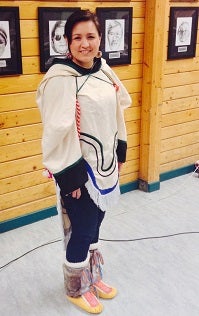In the words of Aili Limakka: We must embrace diversity by accepting our past
In the words of Aili Limakka Laue, a 33-year-old Inuit activist from Kalaallit Nunaat, Greenland (Denmark). She is studying social and political science at the University of Greenland, has been a union volunteer for almost a decade and in 2009 she was elected to the board of the National Inuit Youth Council, Sorlak. She is also a single mother of four.Date:
My true inspiration is my Greenlandic grandmother who persistently and selflessly helped everyone in need whether it was in our community or other communities. She did this her whole life, raising ten children as well.

The Inuit peoples are spread all over the world throughout the Arctic in Russia, Alaska, Canada and Greenland. The Inuit are divided into nations, and even though we have been separated for centuries, we still speak the same language.
The Indigenous cultures of the world are fighting what appears to be an uphill battle, for self-determination and proper education. Resisting assimilation and preserving culture, language and identity, some even struggle for State recognition. These are but a fraction of the struggles we face, as the First Peoples of our territories.
We, the Inuit, regardless of the country we might live in, are living and resisting daily the discrimination that occurs not only through the colonizer, the State, but from our own people as well. The lateral violence, prevalent among all Inuit is a product, a side effect of centuries of colonization and oppression. This attitude is not the Inuit way; and it’s not a set of values that will take our countries to the next level. Our aim is independence. It may come slowly; it may be decades in the making; but it’s never too early to start building a solid foundation.
Unfortunately though, nationalistic and prejudiced notions often cause people to reject, or to outcast members of our own community, if someone doesn’t look Inuk or speak the Inuit language, they are often on the receiving end of hurtful, hateful or disrespectful comments. This is no way to build a Nation. The question of preserving and revitalizing our culture and language is certainly not being enriched by discrimination. We must embrace diversity by accepting our past and history so that we all can heal and give our children the chance that they deserve.
We must foster individual decolonization, build self-esteem, reconnect with our traditional ways and reject the idea that Inuit cannot be diverse as well as unified, modern as well as contemporary. Striking the balance will be the work of future generations, but right now, sowing the seed of equality is my goal. My wish is for my children to grow up proud to be Inuit. I want for them to be the product of all the work that I do, in my country and in the world, to end the oppression and discrimination that is designed to maintain the status quo.
We need to emphasize, over and over again, the need for indigenous populations to receive adequate education, in order for us all to rise and grow as cultures, to see ourselves where we are now in this new globalized world. What I strive for is for us all to have equality. Every human has the right to self-determination.
In Greenland, we were once entirely self-sufficient; now we depend so heavily on imported foods and other foreign products. Our ancestors lived for over 4,000 years in what many consider to be a barren wasteland, ice and snow their only sure resources.
I take pride in everything I do, especially if it means representing my people, and giving voice to the muted and forgotten ones in our society.
I embrace diversity by accepting our past and history so that we all can heal and give our children the chance that they deserve. That is what drives me in my work fighting for indigenous people’s rights throughout the world.
*Aili Liimakka Laue is attending CSW58 on an Yvonne Hébert scholarship.
The views expressed by CSW participants in these blogs are their own and may not necessarily reflect those of UN Women.
To watch a short video clip of Aili (in Greenlandic), click here.
Read more stories in the “In the words of...” editorial series.